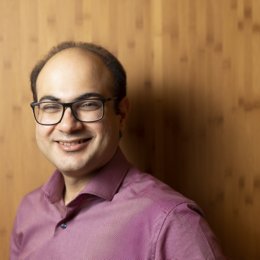Phased Array Antenna systems, back ends
I am Siavash Safapourhajari, assistant professor in the Radio Systems group, Faculty of Electrical Engineering, Mathematics and Computer Science (EEMCS) at University of Twente. My sector plan position focuses on the use of antenna array systems to efficiently connect anything, anywhere and under any conditions.
Background
I received my BSc. and MSc. degrees in Electrical Engineering. In 2015, I joined the Computer Architecture for Embedded Systems (CAES) research group at University of Twente as a PhD student. During my PhD I investigated signal processing in digital receivers for UNB communication and Low Power Wide Area Networks (LPWANs). After my PhD in 2020, I joined the Radio Systems group as an assistant professor. My general research area is signal processing for communication systems, including low power IoT and enabling technologies for 5G and beyond, such as (ultra) massive MIMO, cell-free massive MIMO, mmWave/THz and UAV assisted communications. Furthermore, I am interested in the application of artificial intelligence (AI) and learning algorithms in future generations of wireless communications (especially in the PHY layer). I like to investigate signal processing algorithms and their efficient implementation, taking into account the effects/requirements of RF front-end and digital hardware.
In the years to come
There is an ever-increasing need for connectivity in the world. Thousands of existing applications and future opportunities that improve the quality of life depend on reliable and timely communication. Besides the quality of communication, energy efficiency must also be improved to pave the way for a green future. To achieve this, we must consider the RF front-end and network/application requirements, while focusing on baseband DSP.
In the coming years, I will be active in the following three directions:
- Energy efficiency in broadband communications, taking into account the basic technologies for 5G and beyond, such as (ultra) massive MIMO, cell-free massive MIMO and mmWave/THz communications.
- The application of artificial intelligence (AI) in the physical layer and baseband processing for antenna array communications.
- An energy-efficient and reliable IoT as one of the key drivers of sustainable development. Improving the reliability of low-power IoT for communication and sensing applications.
Research in these areas is helping us to ensure reliable and energy-efficient connectivity for everyone at all times. This supports a variety of applications in healthcare, industry and education, and helps empower societies for a sustainable future.
Education
Scientific research increases people's understanding of the world, develops technology and leads to effective solutions for society. Education plays an important role in this process as a trainer of the future generation of engineers and researchers. Therefore, I believe that teaching is as important as research in a faculty career. I am involved in the subject of Communication Systems (EE-Mod 8) and Embedded Signal Processing (EE-Mod 11). My goal is to impart knowledge to students, motivate them, encourage creativity and critical thinking, and help them acquire essential soft skills (e.g. teamwork). Besides teaching, guiding bachelor and master students with their theses is an important part of my teaching activities.
Collaborations
Successful research is only achieved through a solid network in both academia and industry. We work closely with other research groups at the UT and with other (inter)national universities working on wireless communication systems, their implementation and applications related to radio systems. In addition, we work together with regional, national and European industries to address their practical problems and target Dutch/European funding opportunities

